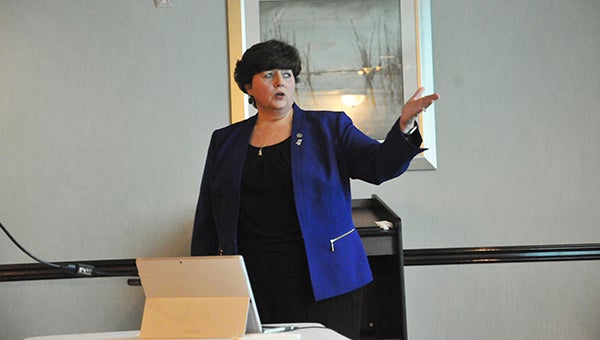Broome: Human trafficking can happen in any hometown
Published 7:00 am Thursday, February 23, 2017

- Paula Broome discusses the indicators of human trafficking to a large crowd on Tuesday. Photo by Taylor Welsh
“What you see and hear during this presentation will shock you,” Deputy Chief and Bureau of Victim Assistance Special Assistant Attorney General Paula Broome said, prepping the participants of her human trafficking symposium.
On Tuesday, Broome spoke at the Holiday Inn Express in Picayune to the Picayune Civic Women’s Club and Juniorette Diamond Club members about the statistics and dangers of sex trafficking, not only in the nation, but in the hometowns of Mississippi.
“One of the biggest myths of sex trafficking is that people always say, ‘That doesn’t happen in my hometown.’ Well guess what? Where there are buyers, there are sellers,” Broome said.
Human trafficking is the fastest growing criminal enterprise in the world, with over 45 million people suffering from this modern day form of slavery, which is more than there have ever been in human history, she said.
Also, Broome said that the human trafficking industry brings in $32 billion in profits annually. To put that in perspective, the NFL, NBA, NHL and MLB average annual revenue of $23 billion combined.
“That’s not even the worst part,” Broome said.
The general public’s assumption of trafficking is that people get randomly snatched away and never return, Broome said. In reality, the majority of victims are groomed into exploitation.
Human trafficking covers more than just sex trafficking, it also includes labor trafficking, which is 64 percent of the trafficking in the world. Twenty-two percent are sex trafficking victims while 10 percent is both labor and sex trafficking, Broome said.
“Think hotel room maids, house keeping staff and nail salons. Heck, I can’t go into a Chinese restaurant or nail salon without thinking who is trafficked and who is not because we know there is such a large Asian population that gets brought into the country for trafficking purposes,” she said. “A lot of times, they do not speak our language so they are completely isolated and have no way of communicating to even get help.”
However, 83 percent of sex trafficking victims are U.S. citizens, with the average age being 12 to 14-years-old.
Broome said that no one is safe from sex trafficking, especially teenage girls in the digital world. In fact, she warned all of Tuesday’s participants that the number one way trafficking recruiters find victims is through social media sites like Facebook, Twitter and Instagram.
“I didn’t think that I could be forced into the sex trafficking industry through social media. It didn’t even cross my mind that it happens like that,” 16-year-old Julia Myers said after the event. “I always thought the recruiters were easy to spot on the street, but they aren’t the stereotypical dirty, ugly old men. Kids are recruiting kids nowadays. That’s a scary thought.”
“They will act like they are your friend, talking to you for months before asking if you wanted to meet up with them for some ‘coffee.’ It is much more methodical than it used to be, and it is becoming easier for them to get girls and boys through the Internet,” Broome said.
Other targets include children from broken or dysfunctional homes, children who have been sexually abused, children in foster homes, children with dependency issues and runaways. In the U.S., 1.6 million kids run away from home each year. Also, one out of every three teenagers on the street will be lured to the sex industry within 48 hours of leaving their home, Broome said.
“The eyes are out there looking. They do this for a living and are always looking for the next ‘product’ for their business,” she said.
Broome suggested that anyone who suspects this activity is occurring in their area to immediately report it to local law enforcement.




